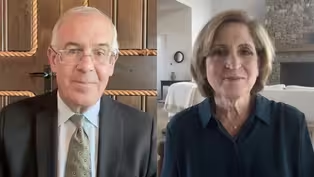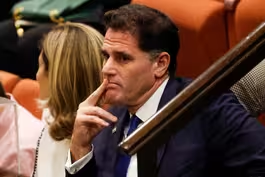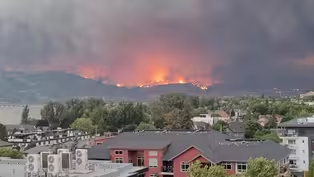
Trump conspiracies inspire threats against civil servants
Clip: 8/18/2023 | 7m 19sVideo has Closed Captions
Trump conspiracies inspire threats against judges, jurors and election workers
Threats of violence have escalated after the fourth criminal indictment of former President Trump. In Georgia, grand jurors’ names, addresses and images were released online by Trump allies and a racist death threat against the judge presiding over the federal Jan. 6 case led to an arrest. Laura Barrón-López discussed the alarming trend and its impact on civil servants with Tammy Patrick.
Problems playing video? | Closed Captioning Feedback
Problems playing video? | Closed Captioning Feedback
Major corporate funding for the PBS News Hour is provided by BDO, BNSF, Consumer Cellular, American Cruise Lines, and Raymond James. Funding for the PBS NewsHour Weekend is provided by...

Trump conspiracies inspire threats against civil servants
Clip: 8/18/2023 | 7m 19sVideo has Closed Captions
Threats of violence have escalated after the fourth criminal indictment of former President Trump. In Georgia, grand jurors’ names, addresses and images were released online by Trump allies and a racist death threat against the judge presiding over the federal Jan. 6 case led to an arrest. Laura Barrón-López discussed the alarming trend and its impact on civil servants with Tammy Patrick.
Problems playing video? | Closed Captioning Feedback
How to Watch PBS News Hour
PBS News Hour is available to stream on pbs.org and the free PBS App, available on iPhone, Apple TV, Android TV, Android smartphones, Amazon Fire TV, Amazon Fire Tablet, Roku, Samsung Smart TV, and Vizio.
Providing Support for PBS.org
Learn Moreabout PBS online sponsorshipGEOFF BENNETT: After Georgia officials announced the fourth indictment of former President Donald Trump, threats of violence escalated.
White House correspondent Laura Barron-Lopez has more on the alarming trend and its impact on civil servants.
LAURA BARRON-LOPEZ: First, it was Ruby Freeman, a Fulton County election worker targeted and smeared by Trump and his allies in the aftermath of the 2020 election.
The Georgia indictment details how members of the enterprise traveled from out of state to harass Freeman, intimidate her and solicit her to falsely confess to election crimes that she did not commit.
And, last week, a racist death threat against the judge presiding over the federal January 6 case led to an arrest.
It's a familiar pattern.
Trump posts vitriolic attacks and conspiracies.
Then his most ardent followers stock or threatened the targets of those attacks.
Tammy Patrick knows the stakes well.
She's a former election worker in Maricopa County and now the CEO of programs at the National Association for Election Officials.
Tammy, thanks so much for joining "NewsHour."
Ruby Freeman and her daughter, who was also an election worker in 2020, have spoken about the impact of that intimidation on their lives.
RUBY FREEMAN, Former Georgia Election Worker: There is nowhere I feel safe, nowhere.
Do you know how it feels to have the president of the United States to target you?
The president of the United States is supposed to represent every American, not to target one.
WANDREA "SHAYE" MOSS, Former Georgia Election Worker: This turned my life upside-down.
I no longer give out my business card.
I don't transfer calls.
I don't want anyone knowing my name.
LAURA BARRON-LOPEZ: Tammy, what did you think after you saw the Georgia indictment criminalize the harassment that Ruby and her daughter faced?
TAMMY PATRICK, National Association for Election Officials: I think it's a much-welcomed response to the situation that we're in, because, unfortunately, for many election administrators, poll workers and individuals in our community that step forward on Election Day to help their fellow citizens cast their ballot, they're faced with some of the same threats.
And although it's extreme to have a president or the former president of the United States attacking you personally, there is still much of this going on to this day.
And so we need to hold people accountable, because it's really creating a problem for the conduct of elections in this country.
LAURA BARRON-LOPEZ: Tammy, you work with election officials.
What are they telling you about the steps they're taking to protect themselves?
TAMMY PATRICK: Yes, listening to those comments from the election workers in Georgia, I'm reminded of stories I'm hearing from election officials all across the country, stories of individuals taking their names off the mailbox at the end of the driveway on the family farm where their family has farmed for generations, because people are coming from out of state and attacking them.
Individuals who no longer go to the local grocery store.
They have to pick up their groceries curbside, because they used to tell me that they would walk down the streets of their of their hometowns, and they felt like they were the pillars of the community.
And now they feel like the pariahs, because of the attacks, because of the assaults.
But I want to be really clear here.
It's not just the election workers.
It's not just election officials.
It's their friends, their families.
Many of them get calls.
And they say things like: "We know your daughter's bedroom is the second one on the back of the house that is by the oak tree," or, "We know that your son walks to school in the morning and goes down Third Street and then turns on Elm."
These are the sorts of tactics that people are using to intimidate our election officials and to try and scare them away from a job and a profession that they love.
LAURA BARRON-LOPEZ: Tammy, those are certainly terrifying stories.
Do you see a through line between the experiences of Ruby, Ruby Freeman, and other election workers, as you just mentioned, and the treatment of the jurors and the judges this week?
TAMMY PATRICK: We find ourselves in an environment where it has become acceptable for some to leverage what they believe are their First Amendment rights to attack others and to foment violence and to intimidate and to threaten others in their official capacity or in the capacity that they have been tasked with, whether they're a juror or stepping in to serve as a temporary poll worker.
This is definitely something that is pervasive.
We're seeing it at school board meetings.
We're seeing it with poll workers.
We're seeing it with jurors, with judges.
And we have to understand that this is not the way that a free and fair society functions.
And we need to hold people accountable when they step beyond that line of the First Amendment protections and step into the line where they're yelling fire in a crowded theater.
LAURA BARRON-LOPEZ: And Ruby Freeman and her daughter, Shaye Moss, are both no longer election officials, election workers, due to their experience.
How are those threats, the intimidations that you just laid out, impacting your ability to recruit future election workers?
TAMMY PATRICK: In this moment, it is difficult finding individuals who will run for office that have the right motivations to serve in that office, who want to be appointed as a county registrar or as an auditor of elections or a supervisor of elections, to serve as a county clerk.
It's also just as critical that we have the hundreds of thousands of individuals that we need to serve at the polling places and to work in the warehouse, to work prior to Election Day preparing materials.
LAURA BARRON-LOPEZ: Are you losing institutional knowledge in the administration of elections because of threats like this?
TAMMY PATRICK: We absolutely are in a situation where, when individuals leave the profession, they take with them, oftentimes, a lifetime of institutional knowledge, which is hard to get back.
One of the challenges in this moment is that, with that loss of institutional knowledge, we could see the increase of errors.
And with those errors occurring, unfortunately, I think it's going to be the case, because we saw this in the midterm elections, that any error can be turned and manipulated and leveraged and weaponized, as though it is somehow demonstrating that our elections are illegitimate, or that they lack integrity, when, in fact, elections are conducted by people, for people, and errors can happen.
And that's why it's important that we have infrastructures in place so, when a mistake is done or happens or occurs, that we have a situation where we can step in with policies and protocols to remedy those errors.
LAURA BARRON-LOPEZ: Tammy Patrick of the National Association for Election Officials, thank you.
TAMMY PATRICK: Thank you so much for having me.
Brooks and Marcus on Trump's Georgia indictment, GOP debate
Video has Closed Captions
Clip: 8/18/2023 | 8m 16s | Brooks and Marcus on Trump's Georgia indictment and upcoming GOP debate (8m 16s)
Comedian Atsuko Okatsuka on her journey to the stage
Video has Closed Captions
Clip: 8/18/2023 | 7m 33s | Comedian Atsuko Okatsuka on her journey to the stage and connecting with audiences (7m 33s)
Israeli minister on possible Saudi Arabia diplomatic deal
Video has Closed Captions
Clip: 8/18/2023 | 7m 35s | Israeli minister Ron Dermer discusses potential diplomatic deal with Saudi Arabia (7m 35s)
Japan, South Korea agree to strengthen military coordination
Video has Closed Captions
Clip: 8/18/2023 | 6m 59s | Biden reaches deal with Japan and South Korea to strengthen military coordination (6m 59s)
Residents flee Yellowknife as wildfire moves closer to city
Video has Closed Captions
Clip: 8/18/2023 | 2m 35s | Residents flee Yellowknife, Canada as wildfire moves closer to city (2m 35s)
Providing Support for PBS.org
Learn Moreabout PBS online sponsorship
- News and Public Affairs

FRONTLINE is investigative journalism that questions, explains and changes our world.

- News and Public Affairs

Amanpour and Company features conversations with leaders and decision makers.












Support for PBS provided by:
Major corporate funding for the PBS News Hour is provided by BDO, BNSF, Consumer Cellular, American Cruise Lines, and Raymond James. Funding for the PBS NewsHour Weekend is provided by...




